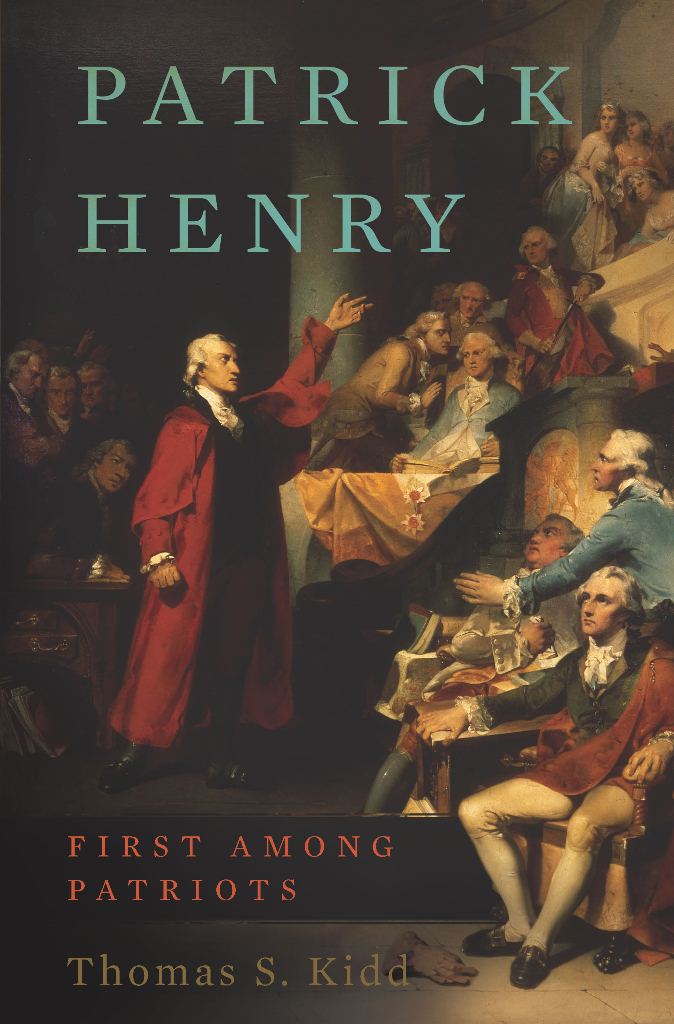If Americans know one thing about Virginia revolutionary Patrick Henry, it is his immortal declaration, made during the Virginia Convention of 1775: "I know not what course others may take; but as for me, give me liberty, or give me death!" According to some accounts, Henry dramatized his point by driving an imaginary dagger into his breast. The man had presence, and that's not debatable. The rest of his legacy, however, is.

As with many events of that era, our records of his famous speech are problematic. Historian Thomas Kidd reminds us that the closest surviving source was published four decades after the fact and based on witnesses' recollections. Yet a larger problem of historical memory motivates Kidd's interest. How are Americans to remember this Founder who seemed willing to give his life for revolution but also fought the ratification of the Constitution? Can a man be called a Founder if he opposed the founding document?
To answer these questions, Kidd surveys Henry's path from backcountry Virginia through the major events of the American Revolution. We learn that the future two-time governor of Virginia, who turned down ambassadorships and Supreme Court appointments, was reduced as a young man to working in a tavern. Early on he twice benefited from lucky or intelligent marriages, his father's and his own, which brought him land and slaves.
Yet debt stalked him through much of his life, due to bouts of lavish spending, a large family, periods of public service, and the vagaries of plantation economics. Henry's fear of these forms of dependency was a motive in his pursuit of liberty; indebtedness was common among Virginia planters, who traded in a global market, but it was also a product of his personal choices.
What financial stability he did have was a product of winning admittance to the bar. He accomplished this ironically but tellingly, managing to impress Virginia's barrister elite with his command of every subject they threw at him, except the law. He had captivated his examiners' imaginations with a vision of what he might become, and the details hardly mattered. Peers doubted many of Henry's capabilities but never his power to persuade. Rather, they feared it. Whether he was a noble defender of liberty in the halls of revolution or an unscrupulous defender of criminals in the county courts would have depended on who was asked and when.
He was certainly a radical voice for revolution, gaining his reputation opposing the Stamp Act in 1765. In a stirring speech, Henry accused the King of treason and stunned Virginia's moderate leaders, who turned the accusation back against him. He quickly backed down. This episode foreshadowed much of Henry's career. He possessed a talent for rising at an auspicious moment with an impassioned and intoxicating appeal. That other politicians, especially moderates, might see his words as vague, rash, or dangerous hardly muted the power of his influence. The public and soldiers adored him.
Henry's legacy has remained controversial in succeeding generations, especially in recent politics. While Kidd's survey soundly places Henry's character in historical context, it will not dispel many of the ambiguities that surround it. This would require a more detailed treatment.
An example is the place of Christianity in Henry's life, one of Kidd's persistent concerns. Kidd explains that Henry came of age as evangelical Protestantism awakened the southern colonies. He heard the sermons of influential Presbyterian Samuel Davies in Hanover County, likely imbibing his talents as a speaker on such occasions. Allusions to the Book of Jeremiah peppered his "Liberty or Death" speech, much as references to the God of the New Testament were common in his other speeches and letters. According to Kidd, Henry believed God was active in the affairs of the world, but it remains unclear how active religious convictions were in the private affairs of Henry. Late in life he regretted to his daughter that he had "given no decided and public proofs of my being a Christian," as opposed to a Deist. Henry felt sure, but others did not.
Without doubt, Henry believed Christian morality was necessary to promote virtue in the people and, therefore, safeguard the fruits of the Revolution. This was a common view among the revolutionary generation, but it was one strand in a larger and fluid republican ideology. Some leaders, as they witnessed the difficulties of waging a revolution, came to doubt all together the wisdom of placing their faith in public virtue.
Henry also found inspiration in the examples of Rome and Greece, but those aspects receive less emphasis in this volume. Without an exhaustive assessment of Henry's life, intriguing questions remain unanswered. Was Henry's success as a lawyer and patriotic orator due simply to dramatic delivery, or did he study and prepare carefully for his speeches? In what proportion did Christian or classical texts mold Henry's republicanism?
Perhaps more than liberty, Henry was committed to an idea of local government. The political unit he trusted was the state. As a governor, he did not hesitate to promote executive power, but he distrusted the Constitution's ability to restrain a president. Noting the variations in Henry's political beliefs, Kidd judges him a pragmatist, a description at which Henry's moderate opponents may have scoffed.
Kidd makes clear that Henry was a controversial figure in his own time, variously considered a patriot, traitor, genius, fool, Christian, and swindler. This is an accessible but not a comprehensive biography, and readers desiring a deep examination of particular aspects of Henry's life will have to look elsewhere. Rather, Kidd relates the origins and tensions of Henry's commitment to the idea of liberty. In the end, Thomas Kidd presents Henry as a person, full of contending desires and inconsistencies, while others have made him a symbol for their beliefs.
